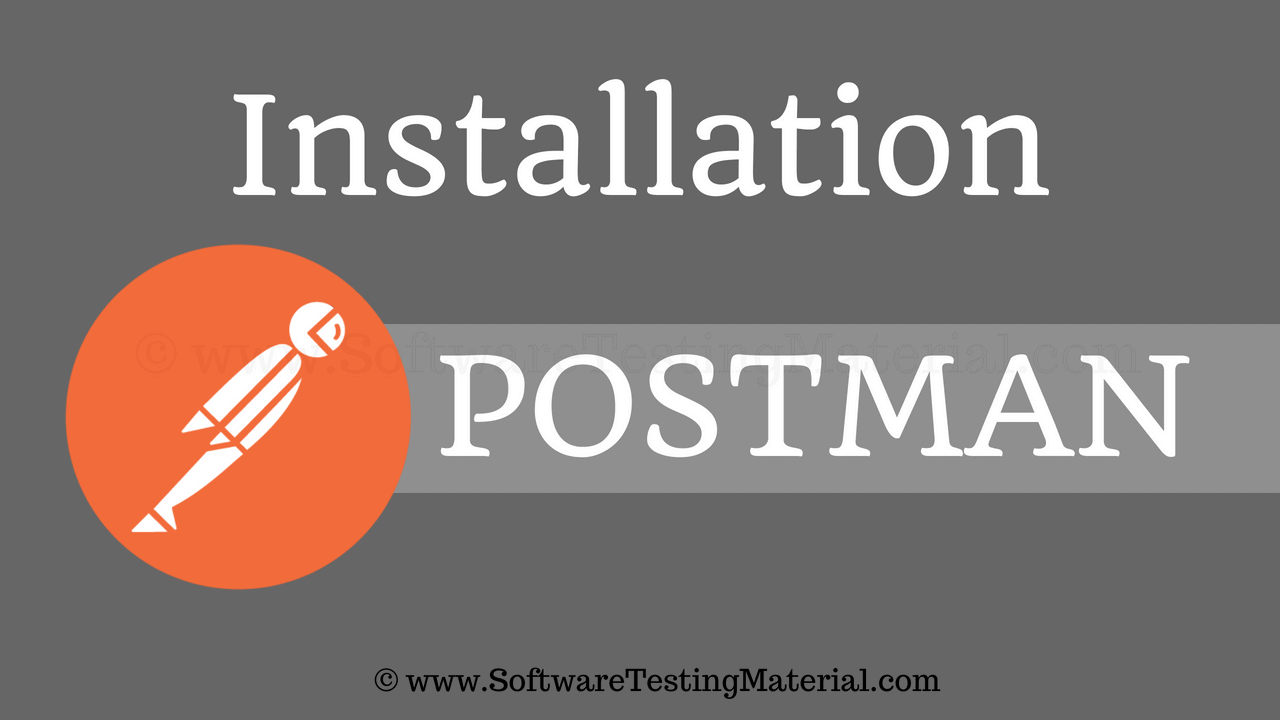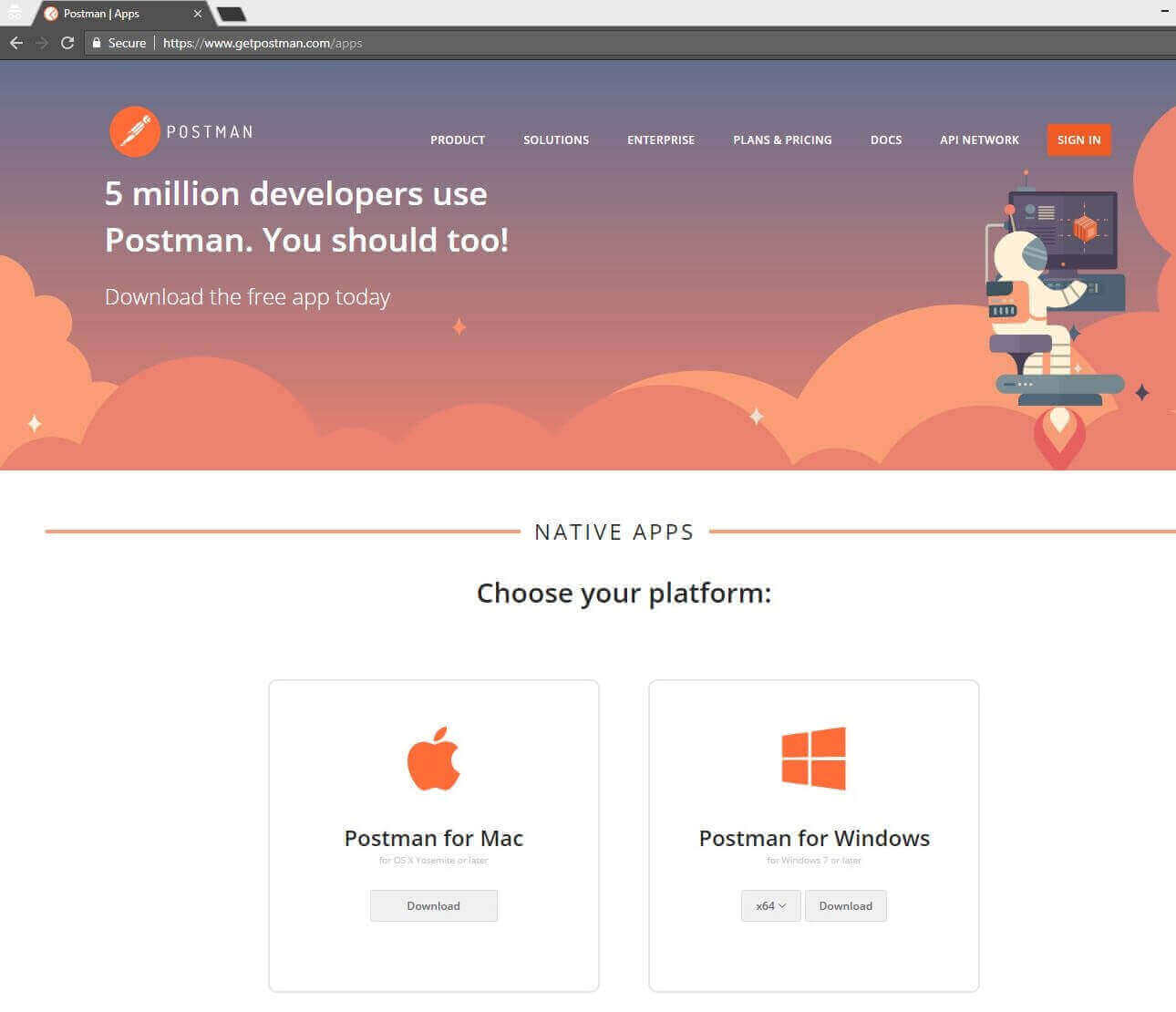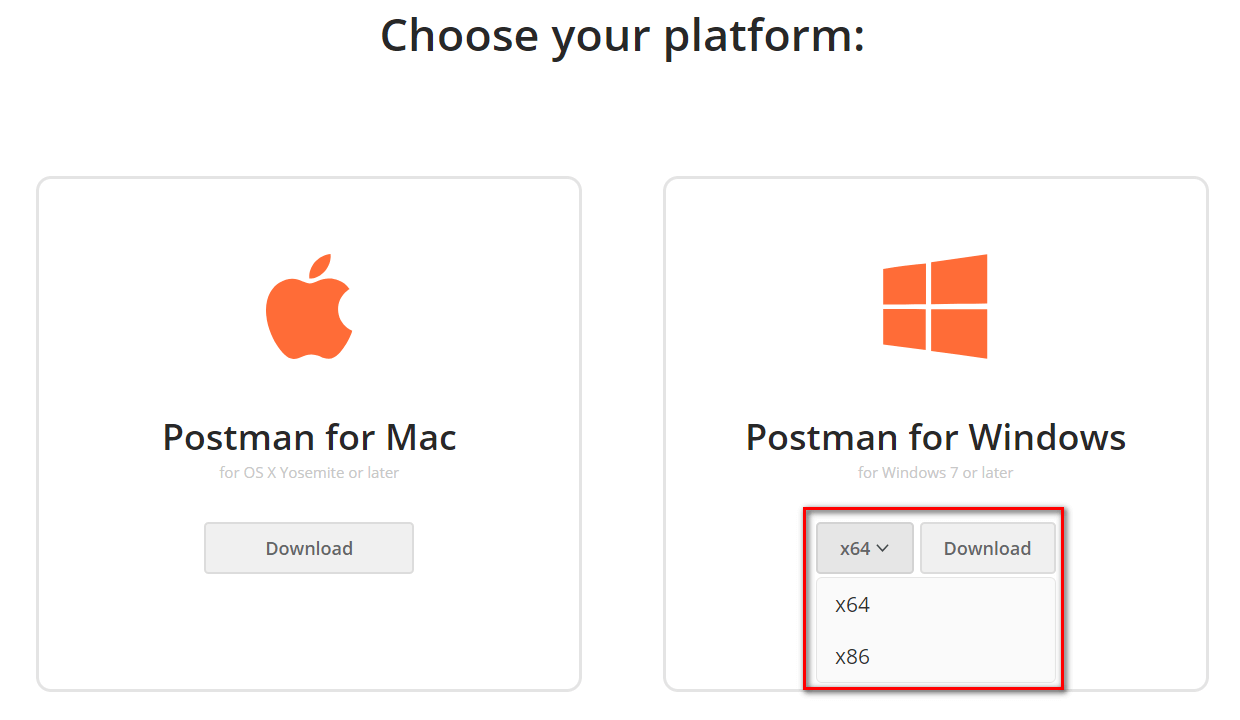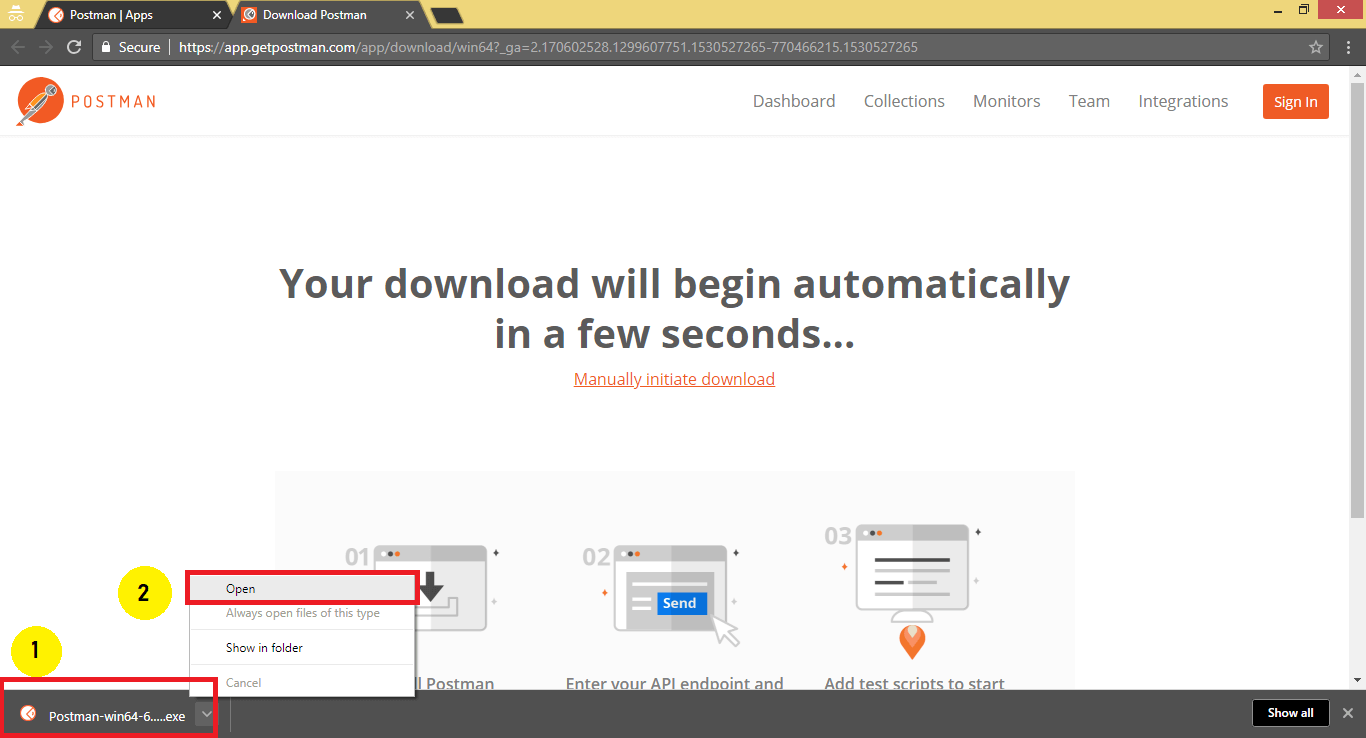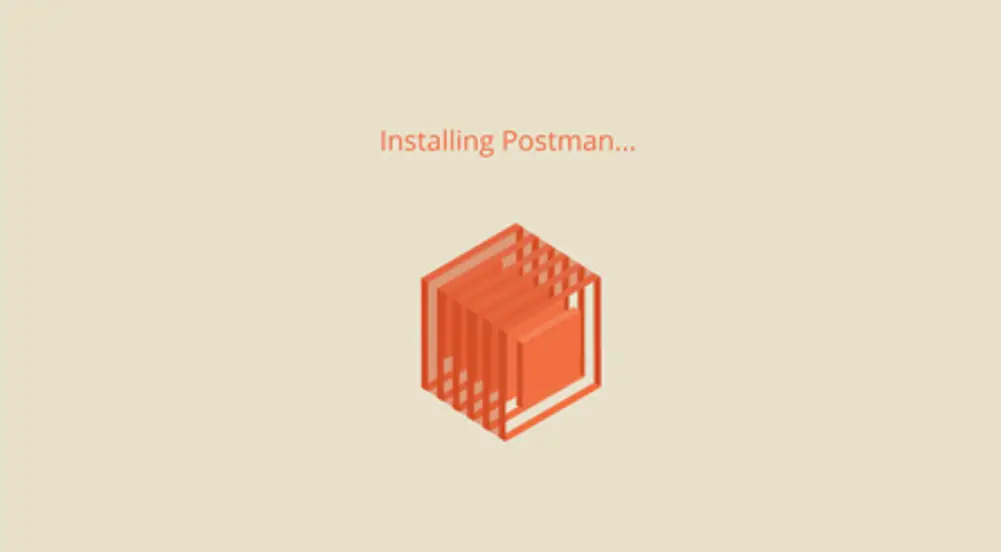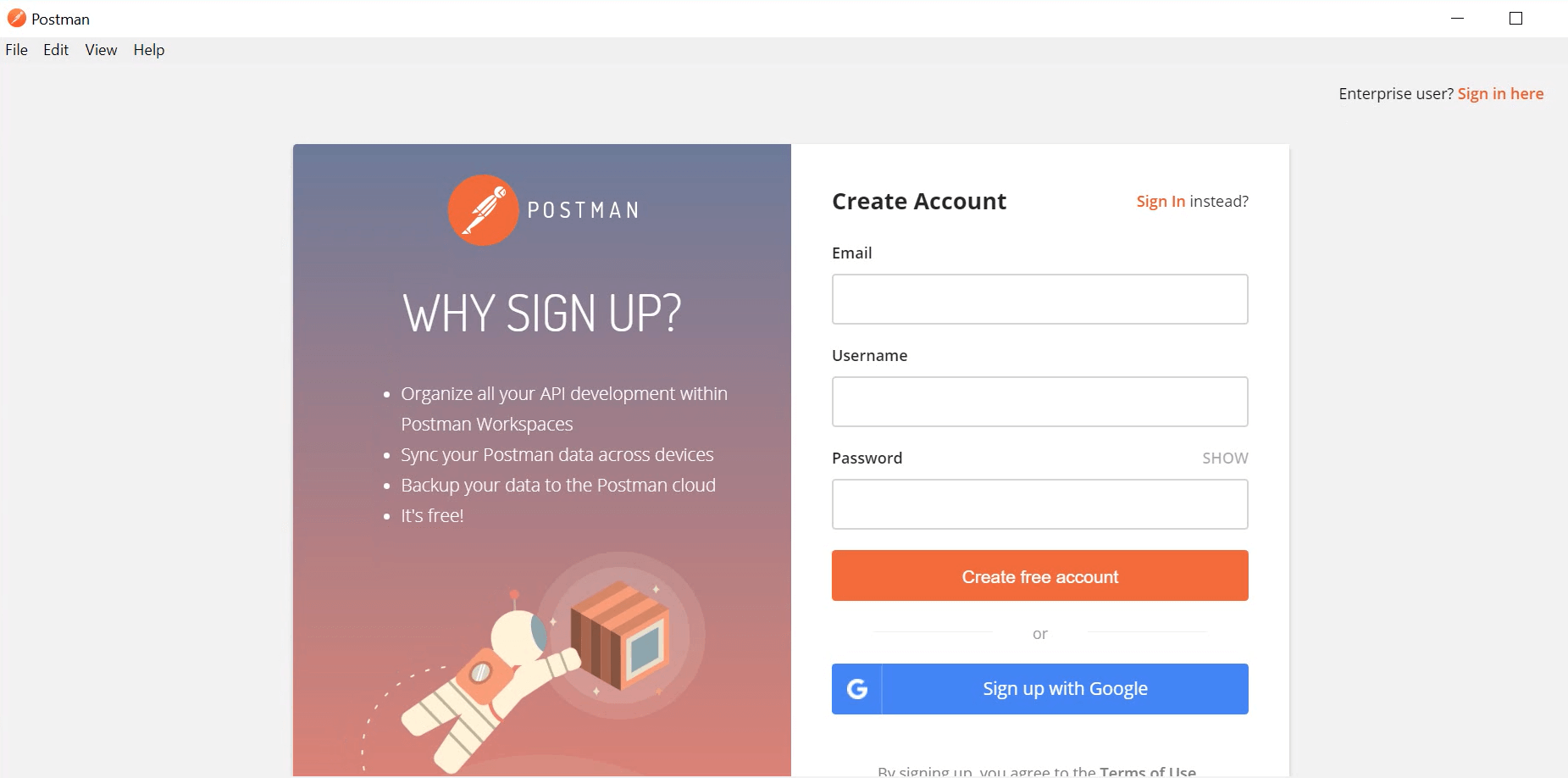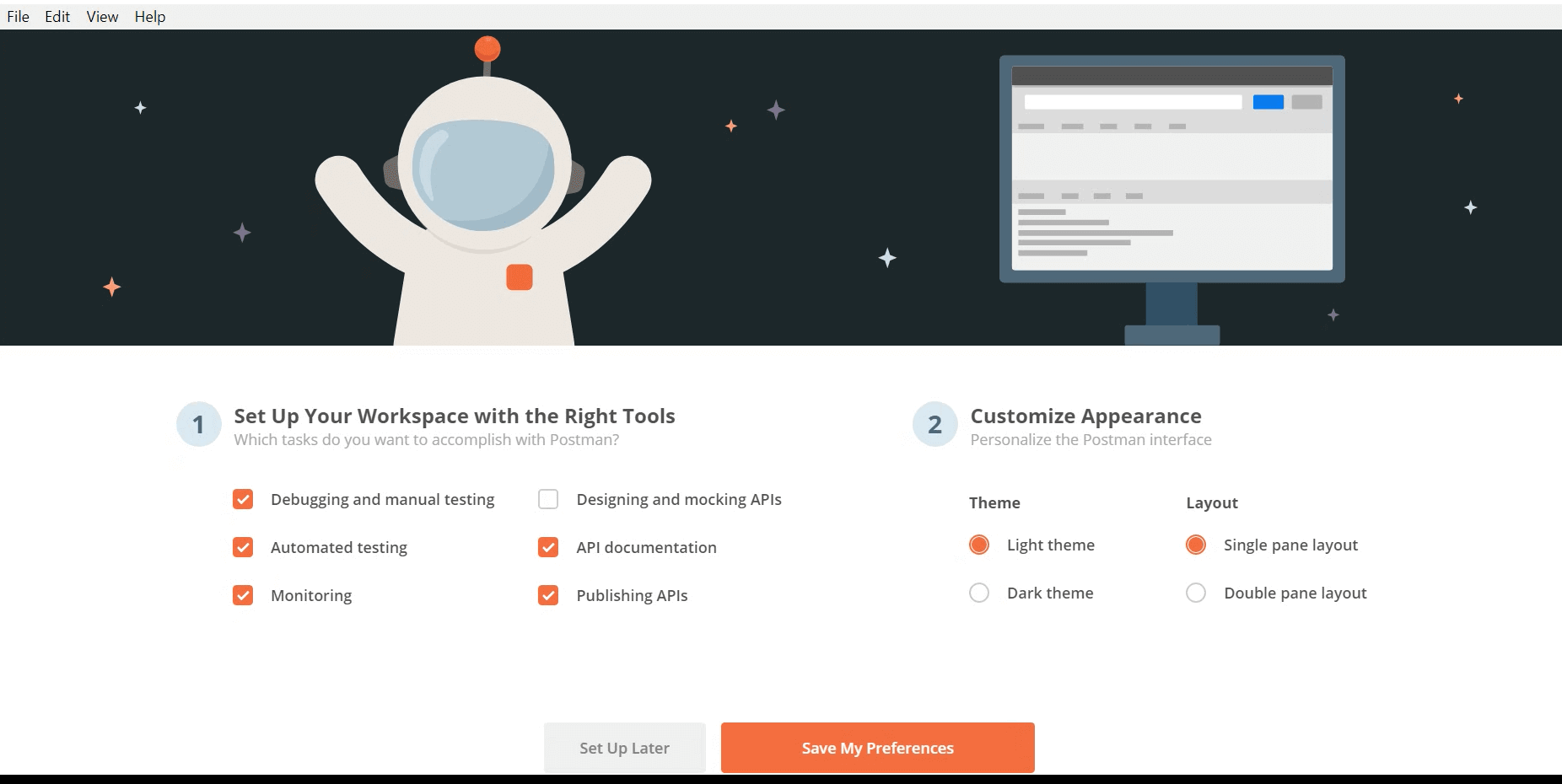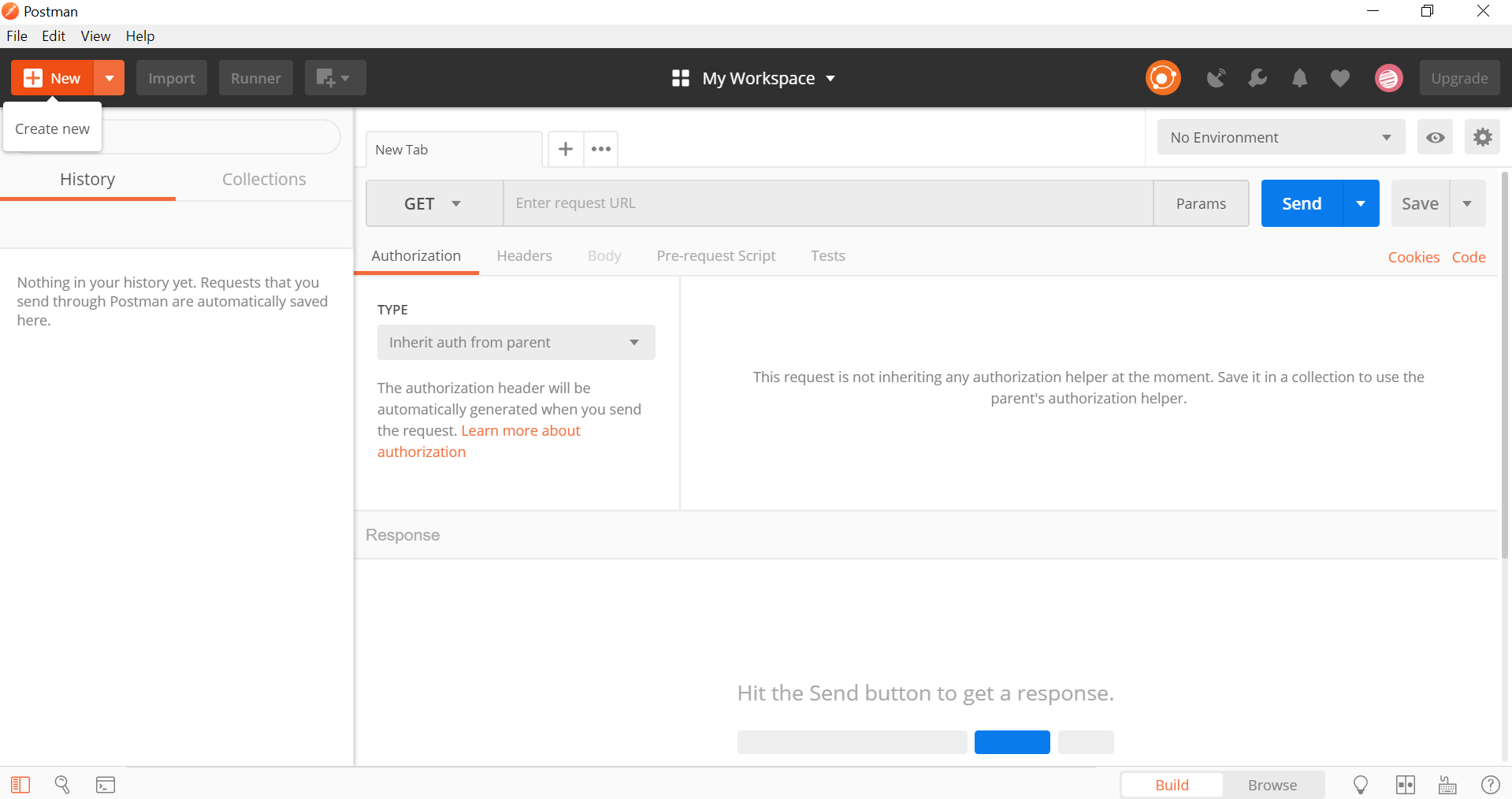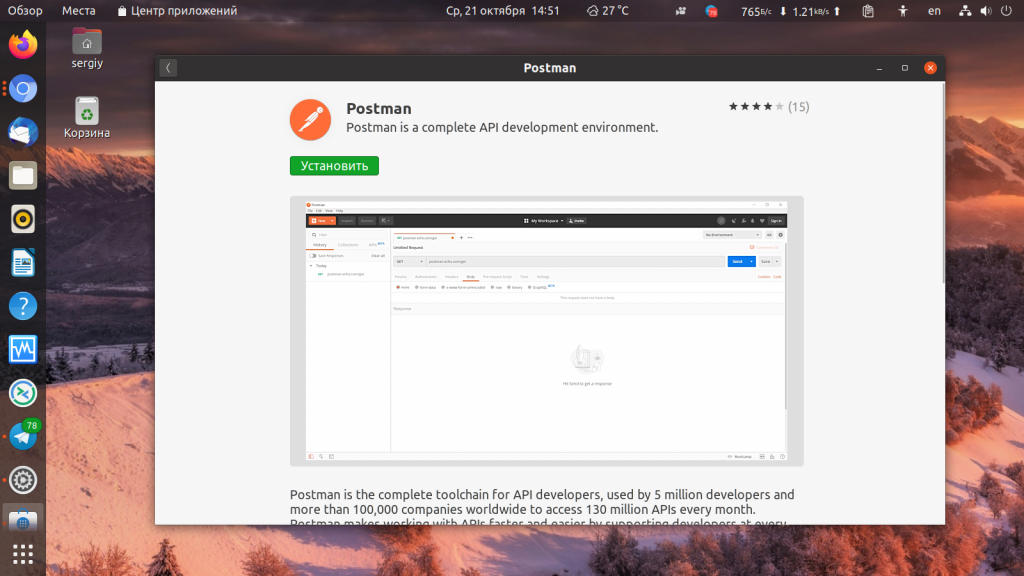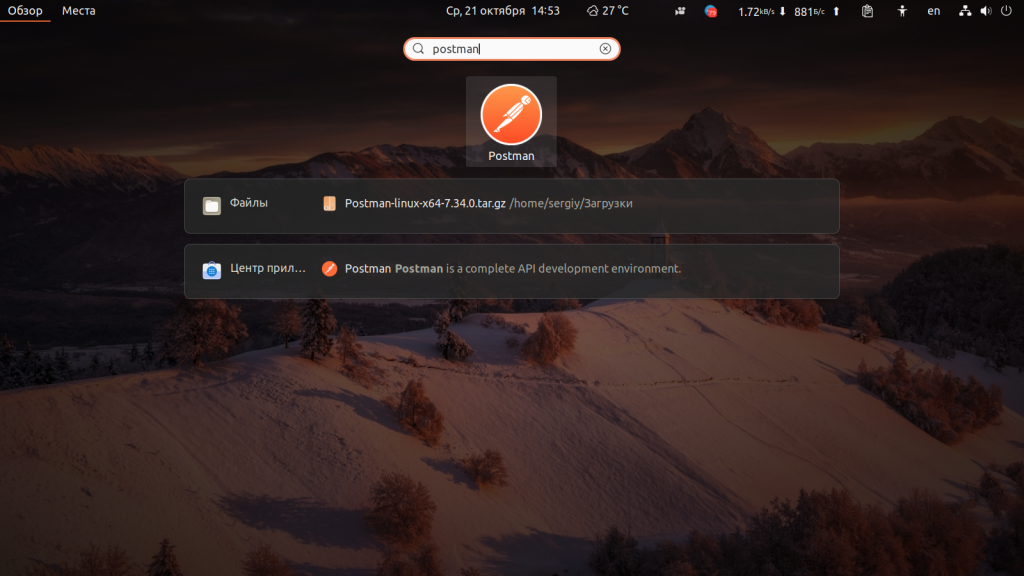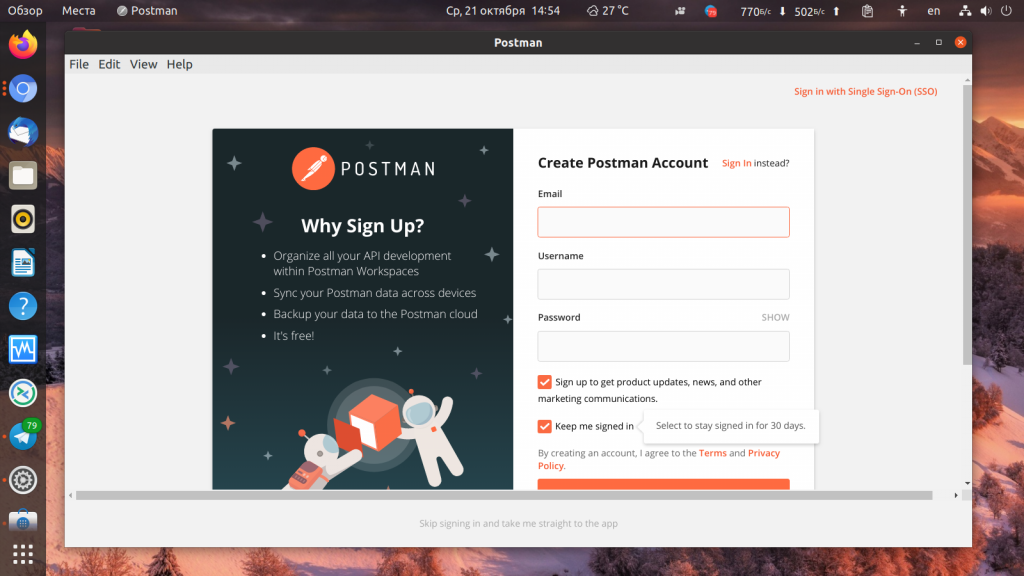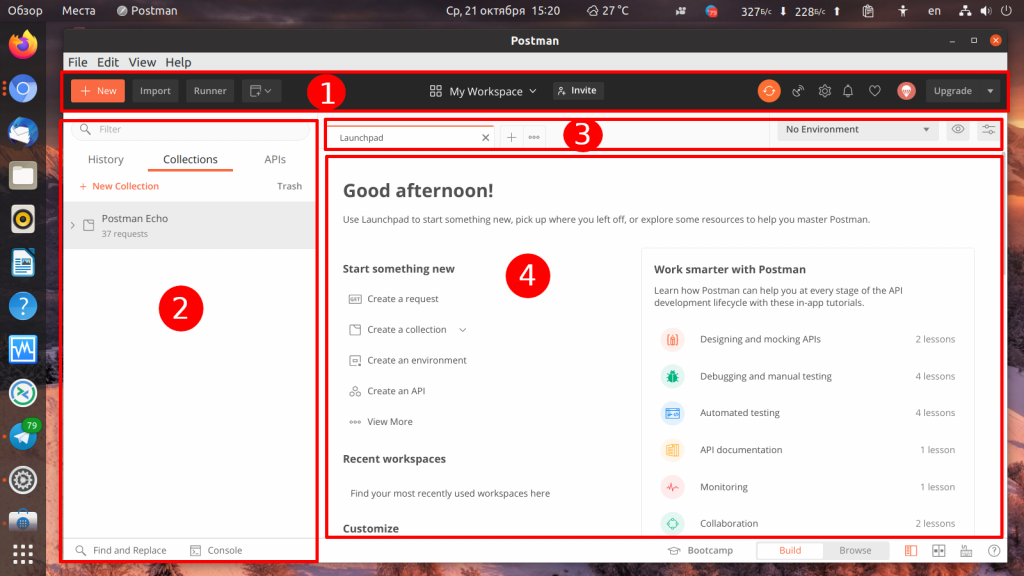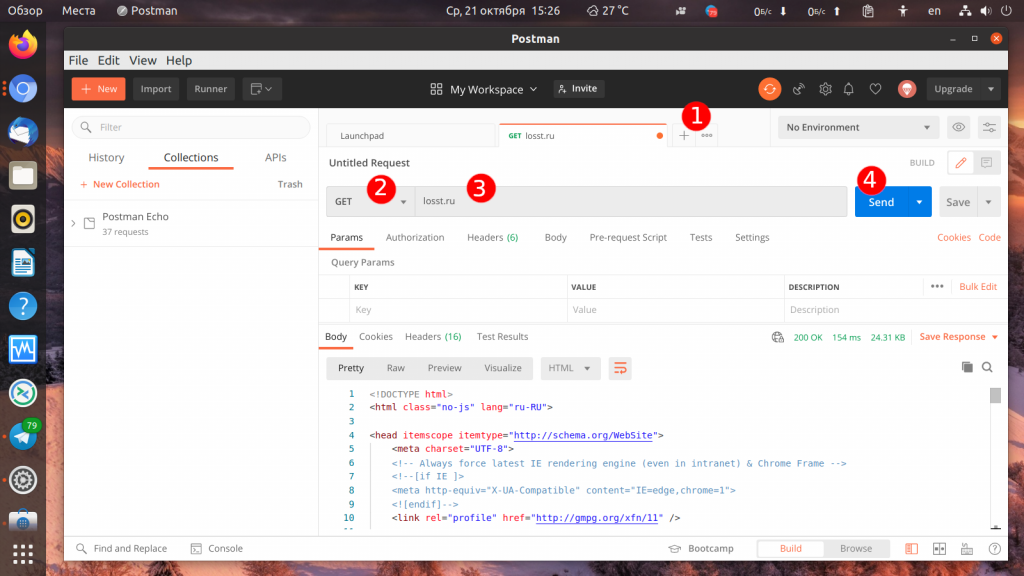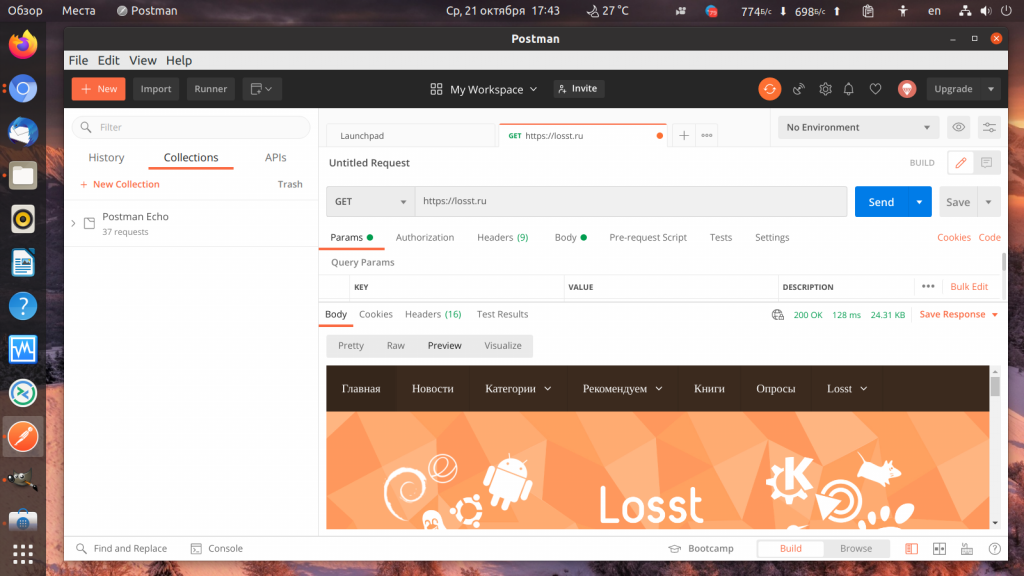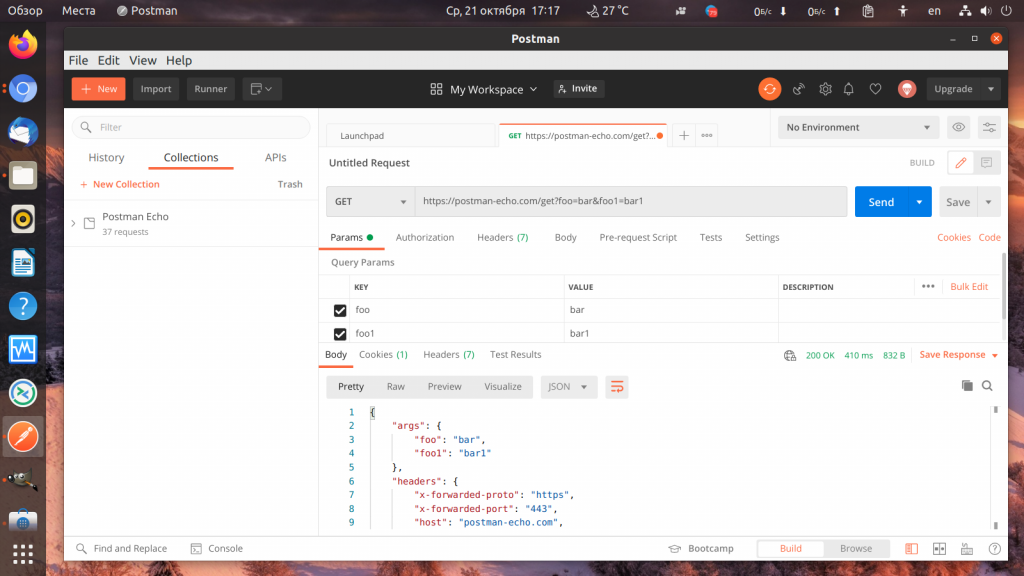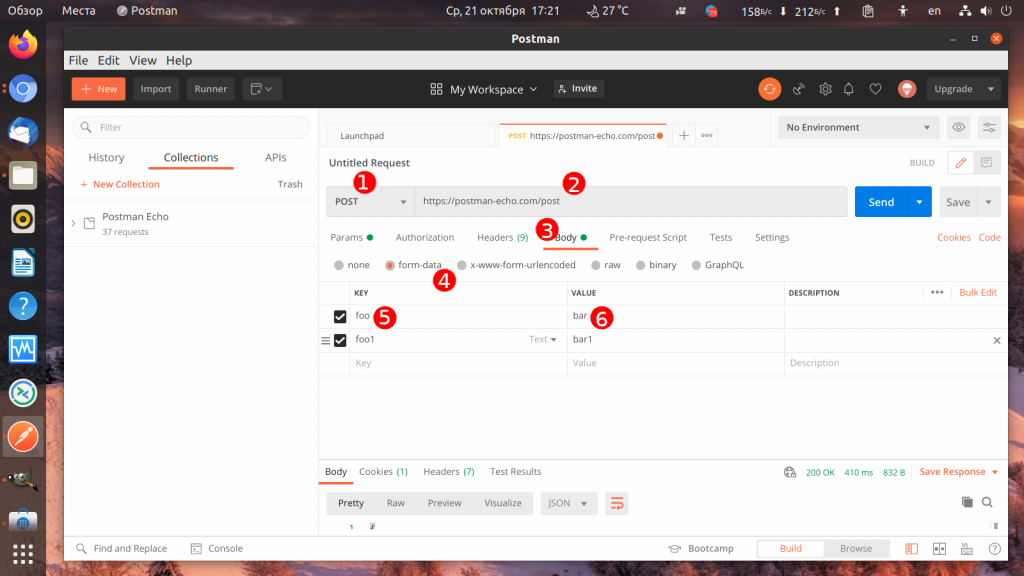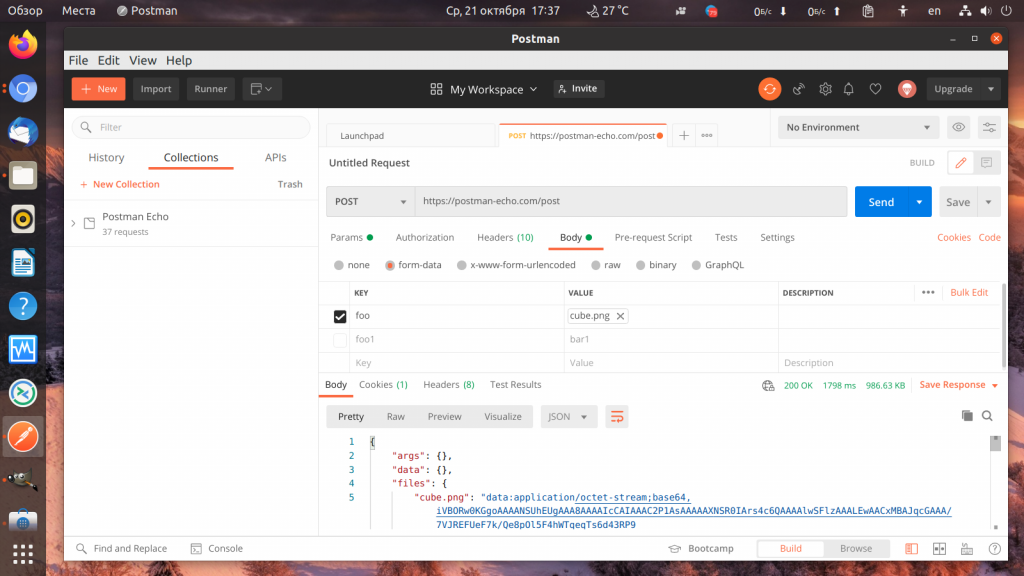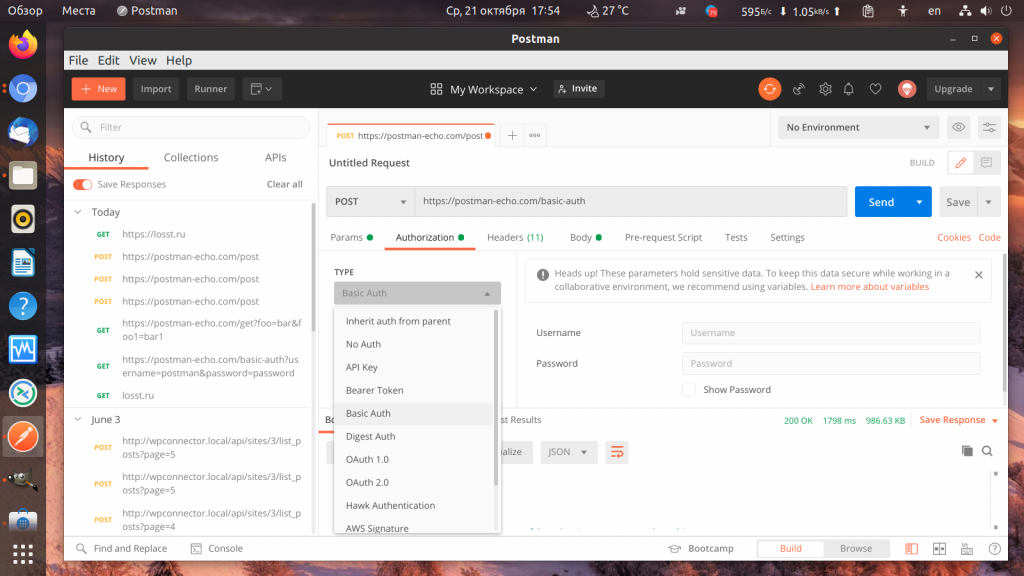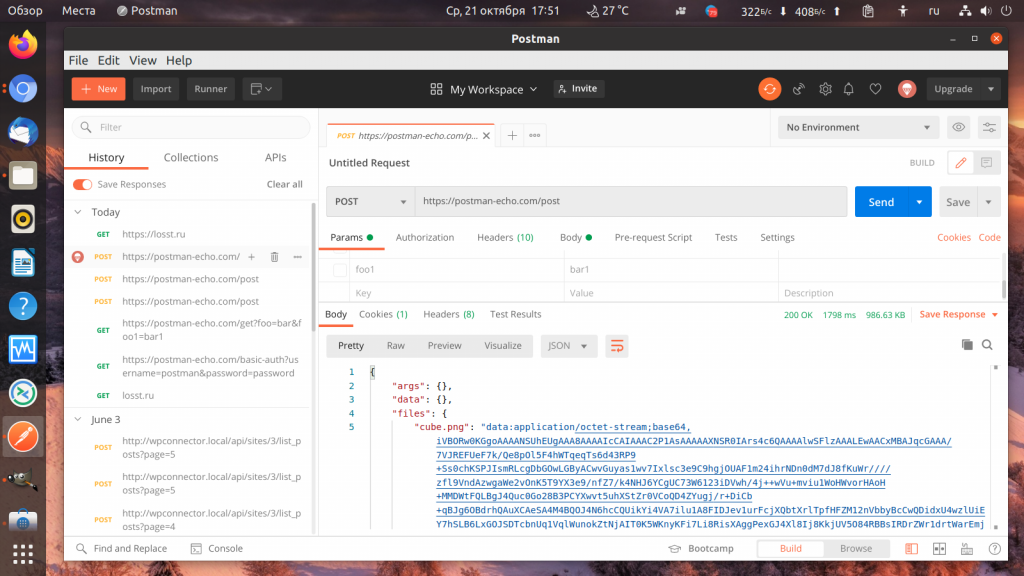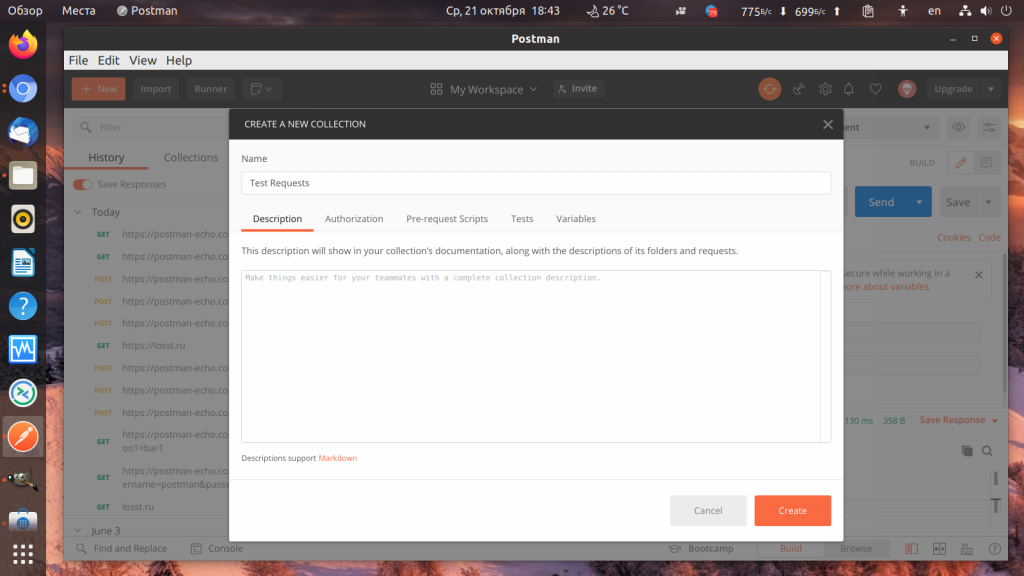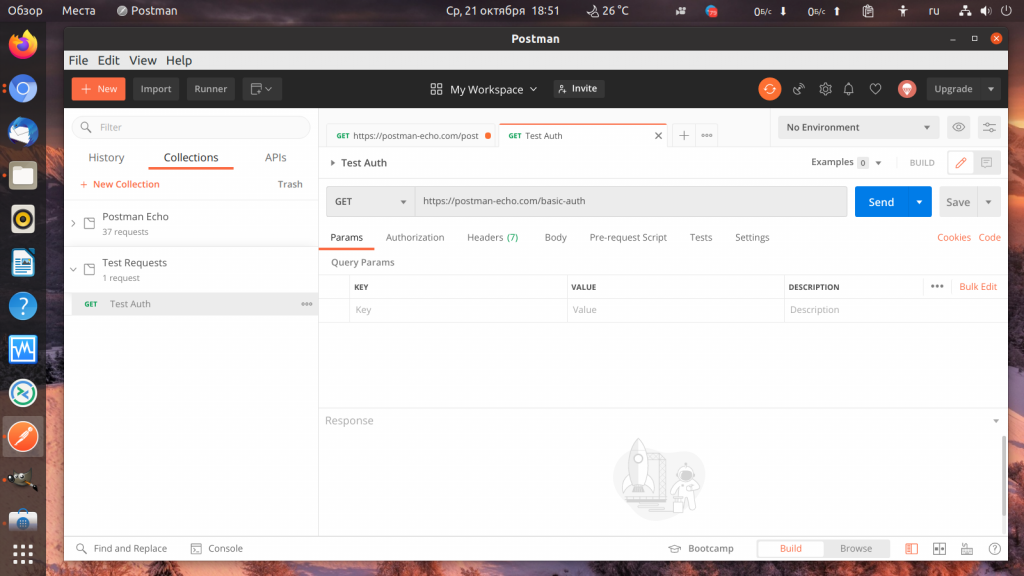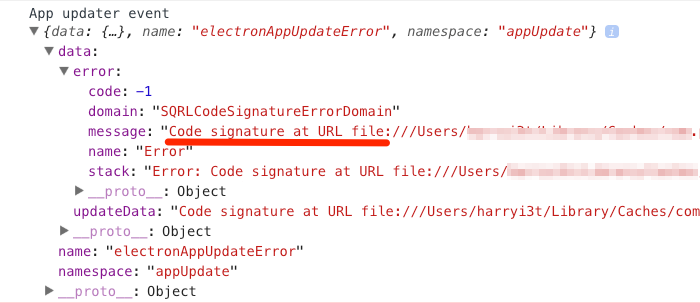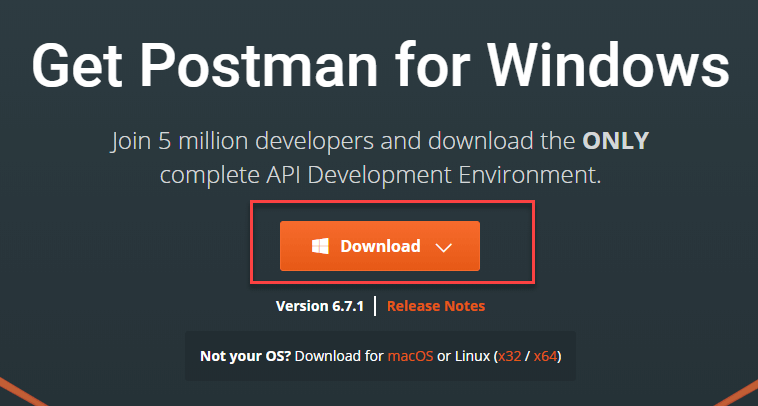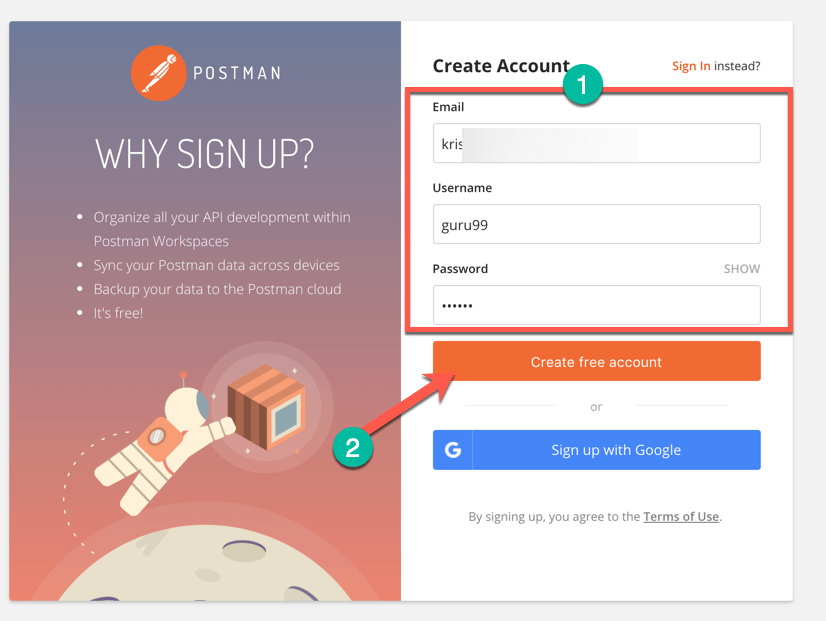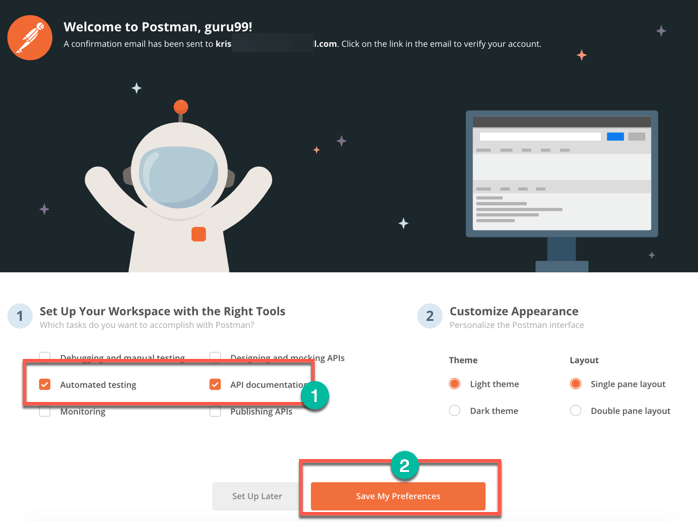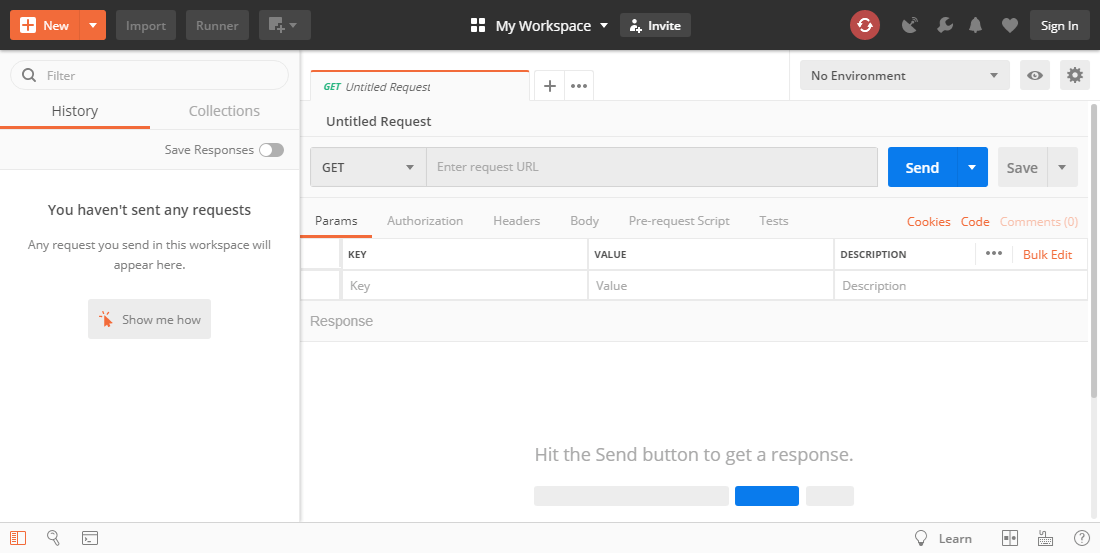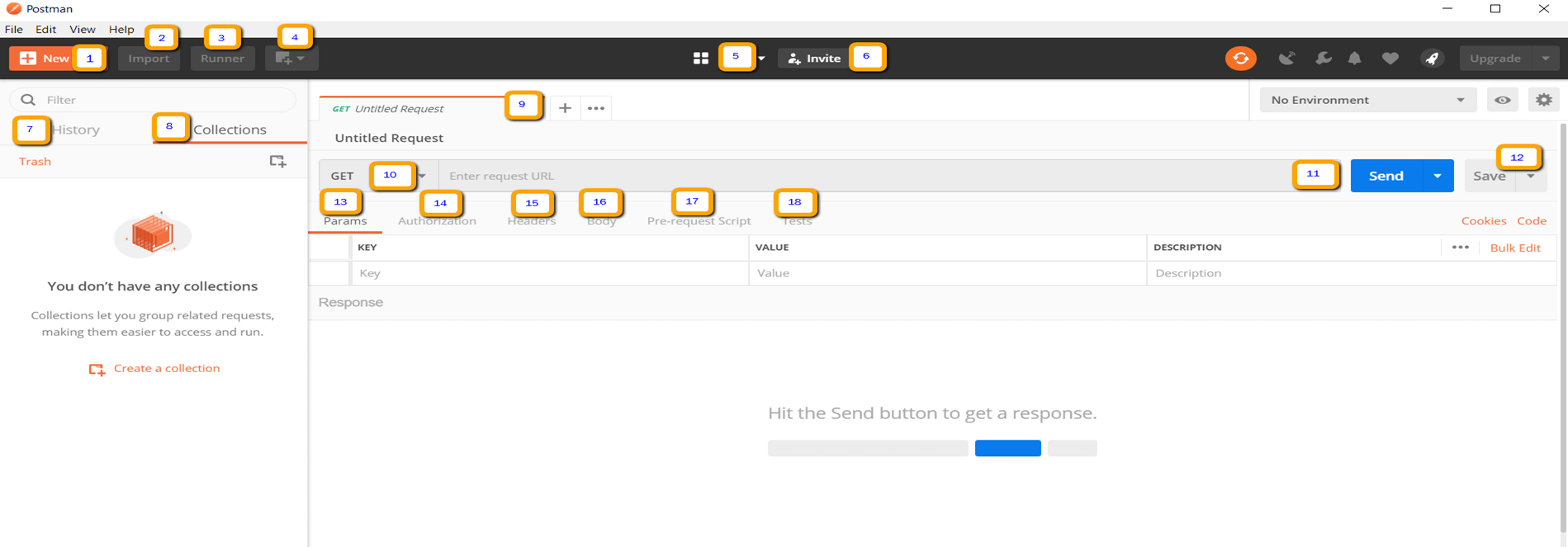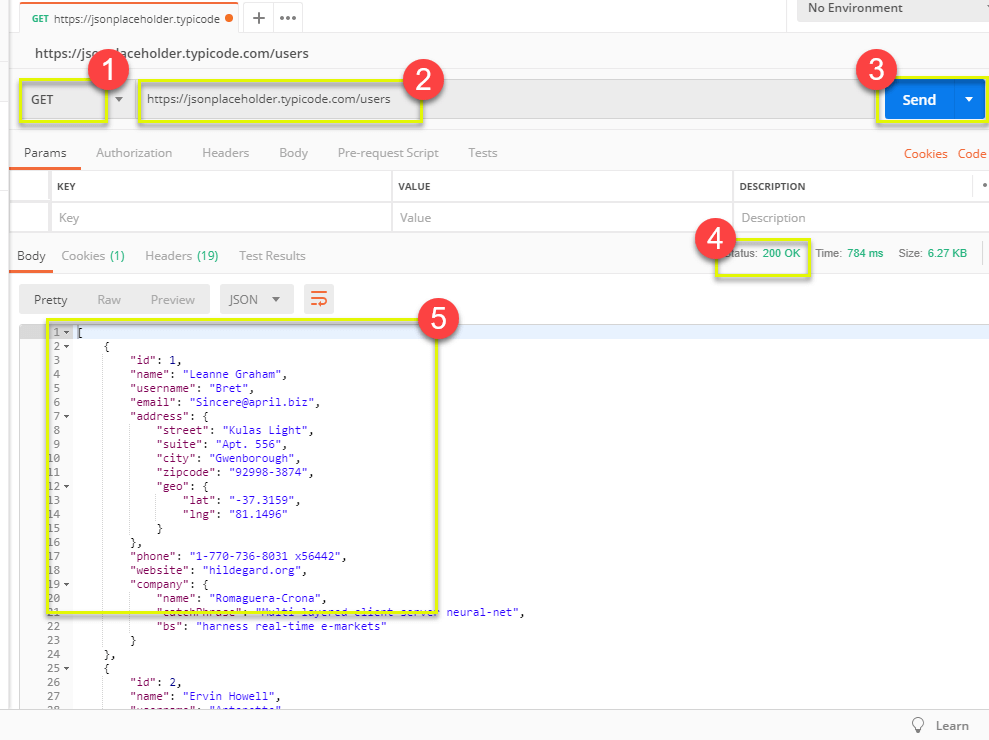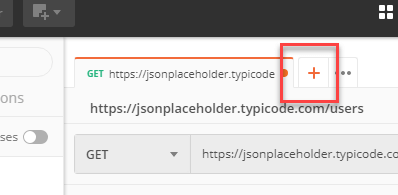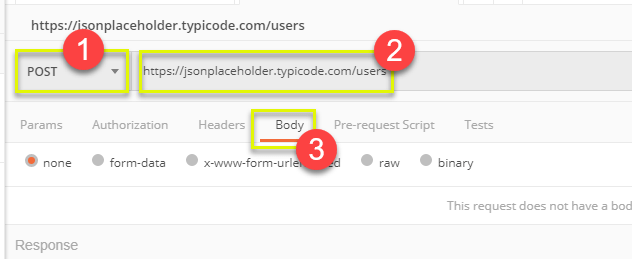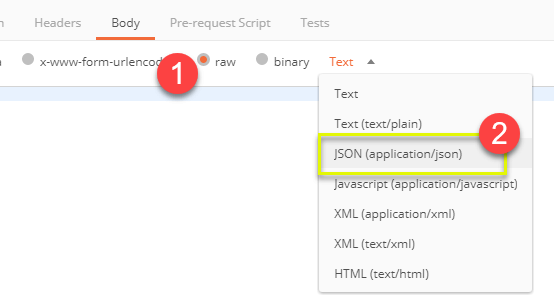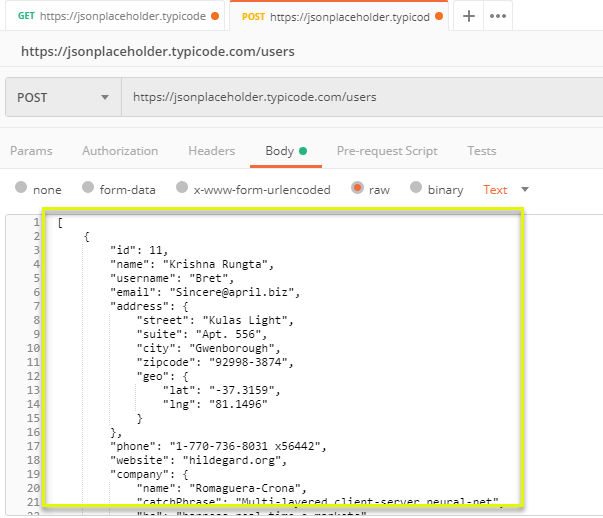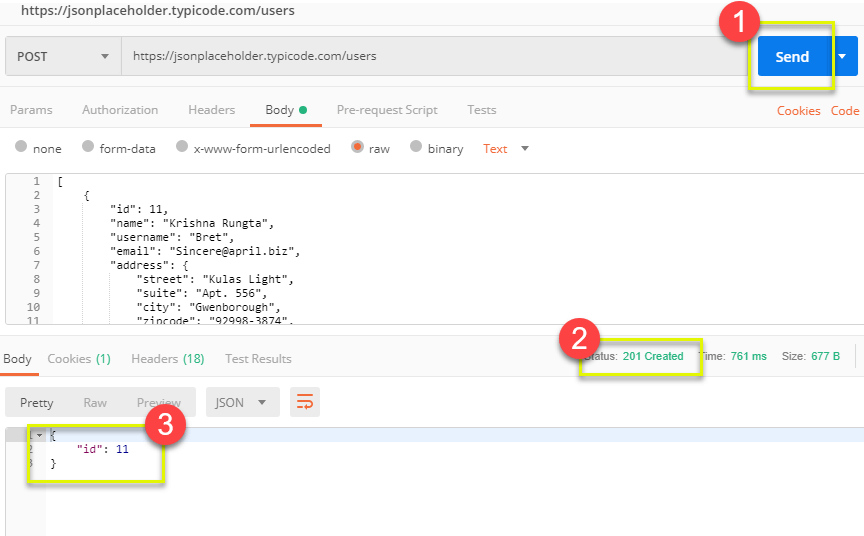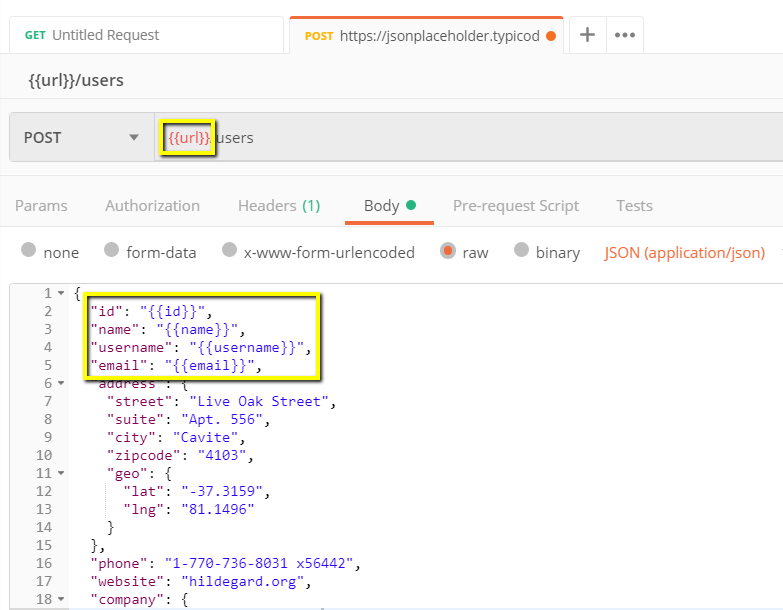как установить postman на windows 10
How To Download And Install Postman | Software Testing Material
In this post, we will see how to download and install Postman tool on Windows. Postman is available as a native app for Mac, Windows, and Linux operating systems.
Related Posts:
We can install postman in two ways
In this post, I will show you how to install Postman as a Native App (Standalone Application). Let’s see how to install Postman native app.
Do you have a question that why we just presenting installation of Postman tool as a native app and not as a Chrome Extension here.
We recommend using the Postman native app. Chrome apps are being deprecated. The last update for Chrome app was released on 26 Jun’18. Postman developers stopped supporting the Postman Chrome App. So we prefer using Postman native app. So in this post, we will show download and install postman as a native app.
Postman is available as a Chrome app (last updated on Jun’18). The Postman Chrome app can only run on the Chrome browser. To use the Postman Chrome app, you need to install Google Chrome. If you already have Chrome installed, head over to Postman’s page on the Chrome Web Store, and click ‘Add to Chrome’.
Install Postman Native Application:
Step 1: To install Postman, go to the this link and click Download for Mac / Windows / Linux depending on your platform.
Here I am going to download Windows 64 bit version, since I have Windows 64 bit machine. If you have Windows 32 bit machine, you can download Postman for Windows 32 bit as shown in the below image.
Once it is downloaded, you can find your downloaded file in the default downloads location of your system. If you are using Chrome browser, the downloaded file will appear at the bottom of the browser as shown in the below image.
Step 2: Open Postman windows 64 bit exe file to install it on your system.
Step 3: Once installation of Postman is completed, you will be asked to create an account. You can create an account later time by clicking on “Take me straight to the app, I’ll create an account another time” link.
Note: I highly recommend you to create an account in the beginning itself. If you have an account, it will allow you to save your work that you do inside postman. You wont lose any of your work.
Step 4: After Sign in, choose your preferred settings and click on Save.
It will automatically opens Postman Tool. After successful installation and registration (register with your Gmail), you could see the below Postman toolkit.
Troubleshooting Postman Updates:
You may encounter issues updating in the Windows version of Postman 6.1. To resolve you must set the environmental variable as mentioned below.
This is all about installation of Postman tool on windows system.
Как пользоваться Postman
Всё это позволяет удобно проверить работу любого API, и даже обычного веб-сайта. В этой статье мы рассмотрим как пользоваться Postman для тестирования HTTP запросов.
Установка Postman
Загрузить Postman для Windows можно на официальном сайте программы. Кроме версии для Windows, здесь есть портативные версии для Linux и MacOS.
После загрузки будет необходимо запустить загруженную программу. В Linux также можно установить программу из центра приложений Ubuntu:
Или с помощью универсального менеджера пакетов snap. Для этого выполните:
sudo snap install postman
После завершения установки postman в Linux можно запускать программу из главного меню.
После первого запуска программа предлагает создать бесплатный аккаунт. Он необходим для синхронизации результатов вашей работы между устройствами. Создайте аккаунт или войдите в уже существующий нажав кнопку Sign In. Для создания аккаунта надо ввести адрес электронной почты, ваш ник, пароль и нажать оранжевую кнопку Create Free Account:
После входа в аккаунт вы попадёте в главное окно программы. Дальше давайте рассмотрим использование Postman, это будет так сказать инструкция для чайников, поэтому если вы уже пользовались программой и всё в ней знаете, то вам будет не интересно.
Как пользоваться Postman
1. Интерфейс
Давайте сначала разберемся с интерфейсом Postman. Главное окно можно условно разделить на несколько частей:
Предлагаю пока не трогать сложные настройки, а разобраться с обычной отправкой запросов.
2. Выполнение запроса
Для того чтобы выполнить простой запрос не сохраняя его в коллекцию найдите на панели вкладок кнопку со значком + и кликните по ней. Откроется новая вкладка, где вы можете выбрать тип запроса GET или POST, а также прописать URL, которую надо открыть. Например, можно получить главную страницу losst.ru. Для отправки запроса нажмите кнопку Send:
В нижней части страницы сразу же отобразится HTML код страницы. Здесь есть несколько вкладок:
Кроме того, на вкладке Body можно выбрать несколько вариантов отображения. Вкладка Pretty полезна для JSON данных, они будут отформатированы в удобном для чтения формате, вкладка Raw выводит данные как есть, а на вкладке Preview можно посмотреть как выглядит открытый сайт:
Это самый простой вариант, но давайте попробуем работать с API.
2. Передача параметров
Программа Postman предоставляет свой API сервис, который можно использовать для тестирования клиентов API. Это postman-echo.com. Например, если отправить запрос по адресу https://postman-echo.com/git и передать туда несколько параметров, вы получите в ответ переданные параметры, а также заголовки в формате JSON.
Выберите тип запроса GET, в поле URL вставьте https://postman-echo.com/get. Затем откройте вкладку Params и здесь в разделе Query Params под надписью Key напишите название параметра, например foo, затем, напротив него под надписью Value напишите значение параметра, например, bar. Таких параметров можно добавить столько, сколько вам нужно. После нажатия кнопки Send запрос отправится и вы получите результат внизу страницы:
Чтобы в следующем запросе эти параметры нам не мешали, снимите с них галочки. Это сообщит программе, что передавать их не нужно.
3. Передача параметров формы
В ответ вы получите те же параметры.
4. Передача заголовков
После отправки запроса вы увидите его в разделе Headers внизу окна, значит он был передан на сервер.
5. Передача файла
Затем нажмите Select file, там, где должно быть значение параметра и выберите файл. После отправки его на сервер, вы найдёте полученный файл в секции files:
Теперь вы знаете как отправить файл Postman, как видите, всё просто.
6. Авторизация Basic Auth
Иногда для защиты тех или иных URL на сервере используется авторизация Basic Auth. Программа Postman тоже умеет её проходить. Для примера будем использовать API URL https://postman-echo.com/basic-auth. Здесь, для того чтобы пройти авторизацию на передать имя пользователя postman, а пароль password.
В рабочей области откройте вкладку Authorization, в разделе Type выберите Basic Auth и заполните имя пользователя и пароль:
Если всё прошло успешно, то тестовый сервер вернёт вам ответ authenticated: true:
7. История запросов
8. Коллекции запросов
Если вам нужно часто повторять одни и те же запросы с определёнными параметрами, вы можете создать отдельную коллекцию запросов. Для того чтобы создать коллекцию нажмите кнопку New на верхней панели, затем выберите Collection и в открывшемся окне введите имя коллекции, например, Test Requests:
Чтобы добавить в коллекцию запрос, нажмите ту же кнопку New и кликните по ссылке Request. В открывшемся окне надо ввести имя запроса, а чуть ниже выбрать коллекцию к которой следует его добавить. После этого нажмите кнопку Create и можете заполнять данные запроса и смотреть ответ как это описано выше. Когда всё будет настроено кликните по кнопке Save, которая находится рядом с Send чтобы сохранить этот запрос.
После этого вы сможете найти свой запрос открыв на боковой панели вкладку Collections:
Благодаря использованию аккаунта все ваши запросы будут синхронизированы между устройствами, на которых вы используете программу.
Выводы
Теперь вы знаете как пользоваться Postman для проверки работоспособности вашего API. Конечно, мы рассмотрели далеко не все возможности и функции программы, но этого вам будет достаточно чтобы начать её полноценно использовать и отправлять различные запросы. А какие программы используете вы для таких целей? Напишите в комментариях!
Installing and updating
Postman is available on the web at go.postman.co/home and as a native desktop app for Mac, Windows (32-bit / 64-bit), and Linux (64-bit) operating systems.
To get the latest version of the Postman desktop app, visit the download page and select Download for your platform.
Installing Postman on the desktop
Note that the Postman team only tests, fixes bugs, and provides support for the app on Mac, Windows, Linux, and the web.
Installing Postman on Mac
Download and unzip the app using the built-in Archive Utility app. Double-click Postman. When prompted, move the file to your Applications folder—this will ensure that future updates can be installed correctly.
The minimum OS version supported is macOS 10.11 (El Capitan).
You may encounter a «Library not loaded» error if you attempt to unzip and install Postman using a third-party app—using the default Archive Utility for Mac should resolve this.
Installing Postman on Windows
Download the app. Double-click the exe file to install it.
Postman supports Windows 7 and above. Both ia32 (x86) and x64 (amd64) installers are available for Windows. Windows for ARM devices is possible by using the ia32 binary.
Installing Postman on Linux
To install manually, download and unzip the app, for example into the opt directory. You will need sudo privileges.
To start the app from a launcher icon, create a desktop file, naming it Postman.desktop and saving it in the following location:
Enter the following content in the file—replacing opt if you extracted the file somewhere else—and save it:
Postman supports the following distributions:
The support of certain Linux distributions depends on if they are supported by Electron. Refer to Electron’s documentation.
It is recommended you install Snap as it includes all the libraries that the app needs and they are bundled with the app itself.
Avoid starting Postman using the sudo command, as it will create permission issues on the files created by Postman.
Make sure you have read/write permission for the
/.config folder where Postman stores information.
If you are an Ubuntu 18 user, you will also need to install the libgconf-2-4 package with the command apt-get install libgconf-2-4
Using Postman on the web
You can use Postman in your web browser to carry out your API development and testing tasks in conjunction with the Postman Agent. To access Postman on the web, visit go.postman.co/home.
Postman’s web application is optimized for the following browsers:
Installing the Postman desktop agent
If you are using the Postman web client, you will need to also download the Postman desktop agent. You will be prompted to download and install the agent so that you can make requests from the web. You can also download the agent directly from the Downloads page.
The Postman agent overcomes the Cross Object Resource Sharing (CORS) limitations of browsers, and facilitates API request sending from your browser version of Postman. Once you have the agent installed you will be able to use it with web requests.
You can either enable Auto-select option or manually select the agent (Cloud, Desktop, or Browser) you would like to use for your requests.
Once you enable the option for Auto-select, Postman will automatically select the best agent for your requests.
You can select the Cloud Agent if you want to send HTTP requests via Postman’s secure cloud servers. While using the locally running Postman, it is recommended you use the Desktop Agent. Using the Browser Agent for your web requests has some limitations.
If you try to send a request and it isn’t successful because the agent is not selected, you will see a link in the response area which you can select to switch to the agent and try your request again. Read more about the agent.
Postman on the web is under active development, but there are a few features you can currently only access in the desktop app and not in your web browser:
The native Postman apps will notify you when a major update is available. For other updates you will see a dot on the settings icon. If the indicator is red instead of orange, it indicates a failed update.
Select the update option to download or install the latest update. You will see a notification when the download is complete, prompting you to restart the Postman app to apply the updates. If you’re not ready to update yet, choose Later to auto-update the next time you launch the app.
You can configure your preferences to enable automatic download for major updates in Settings > Update. Postman automatically downloads minor updates and bug fixes.
Postman Chrome app (deprecated)
The Postman Chrome app is deprecated—if you’re using the Chrome app, you can retain your data when you switch to the native app either by syncing with a Postman account you’re signed into, or by exporting from Chrome and importing into the native app.
The native app is built on Electron, and overcomes a number of restrictions of the Chrome platform.
Migrating to the native app
To switch from the Chrome app to native, download Postman and sign in to your account. Start the native app, and your history and collections will be automatically synced.
Alternatively, if you don’t want to sign in to your Postman account, you can bulk export your Postman data from the Chrome app, and then bulk import into the new native app at Settings > Data.
Note that importing will overwrite your existing data. For more on bulk import, see Importing Postman data.
Using Postman behind a firewall
Postman’s infrastructure runs on Amazon’s AWS platform. If you are operating behind a network firewall, you will need to allow the following domains to make WebSocket connections for Postman:
By default, WebSocket connections use the same ports as HTTP (80) and HTTPS (443).
Postman does not have a fixed IP range that can be provided. If necessary, please refer to the current AWS IP ranges and allow the broad range provided.
Troubleshooting your Postman installation
If you encounter any issues installing and running Postman, check out the following tips. If these do not help, please refer to the installation posts on the community forum and create a new post if your issue is not already covered.
Update failed error
If you see an Update Failed notification in Postman, you can use the DevTools to investigate.
Open the DevTools using View > Developer > Show DevTools (Current View). Some known errors are as follows:
Error message: Cannot update while running on a read-only volume
Error message: Code signature at URL file:///. did not pass validation: code object is not signed at all
Update button not available
If you are using Postman for Linux, and installed the app with the Ubuntu Software Center or Snap Store, you may not see a Check for updates button. This is because the updates are handled by the store, which should automatically update Postman on a regular cadence.
If you’re having trouble with installation or updates, reach out for Postman support. If your installation is working as expected, send your first request!
Учебник Postman
What is Postman?
Postman is a scalable API testing tool that quickly integrates into CI/CD pipeline. It started in 2012 as a side project by Abhinav Asthana to simplify API workflow in testing and development. API stands for Application Programming Interface which allows software applications to communicate with each other via API calls.
In this training course, you will learn:
Why Use Postman?
With over 4 million users nowadays, Postman has become a tool of choice for the following reasons:
Как скачать и установить POSTMAN
Postman — инструмент с открытым исходным кодом, который можно легко загрузить. Вот шаги для установки:
Шаг 1) Перейдите на https://www.postman.com/downloads/ и выберите нужную платформу среди Mac, Windows или Linux. Нажмите Скачать.
Шаг 2) Ваша загрузка идет, сообщение должно теперь отображаться на странице приложений. После завершения загрузки нажмите «Выполнить».
Шаг 3) Установка начинается
Шаг 4) В следующем окне зарегистрируйтесь для учетной записи почтальона
ПРИМЕЧАНИЕ. Существует два способа регистрации учетной записи Почтальона. Одним из них является создание собственной учетной записи Postman, а другой — использование учетной записи Google. Несмотря на то, что Postman позволяет пользователям использовать инструмент без входа в систему, регистрация гарантирует, что ваша коллекция будет сохранена и доступна для последующего использования.
Шаг 5) Выберите необходимые инструменты рабочей области и нажмите «Сохранить мои настройки».
Шаг 6) Вы увидите стартовый экран
Как пользоваться почтальоном
Ниже находится рабочее место почтальона. Давайте рассмотрим различные возможности инструмента!
Работа с GET-запросами
Запросы на получение используются для получения информации с данного URL. В конечную точку не будет внесено никаких изменений.
Мы будем использовать следующий URL для всех примеров в этом руководстве
В рабочем пространстве
* Примечание. В некоторых случаях запрос Get может быть неудачным. Это может быть связано с неправильным URL-адресом запроса или необходима аутентификация.
Работа с POST-запросами
Запросы на отправку отличаются от запроса на получение, поскольку пользователь обрабатывает данные, добавляя данные в конечную точку. Используя те же данные из предыдущего урока в запросе Get, давайте теперь добавим нашего собственного пользователя.
Шаг 1) Нажмите на новую вкладку, чтобы создать новый запрос.
Шаг 2) В новой вкладке
Шаг 3) В теле,
Шаг 4) Скопируйте и вставьте только один пользовательский результат из предыдущего запроса get, как показано ниже. Убедитесь, что код был правильно скопирован с помощью парных фигурных скобок и скобок. Измените id на 11 и имя на любое желаемое имя. Вы также можете изменить другие детали, такие как адрес.
* Примечание: пост-запрос должен иметь правильный формат, чтобы гарантировать, что запрашиваемые данные будут созданы. Рекомендуется использовать Get first для проверки формата запроса в формате JSON. Вы можете использовать такие инструменты, как https://jsonformatter.curiousconcept.com/
Шаг 5) Далее
Как параметризовать запросы
Параметры создаются с помощью двойных фигурных скобок: <
Теперь давайте создадим запрос на получение параметров.
Шаг 1)
Не должно быть никакого ответа, так как мы не установили источник нашего параметра.
